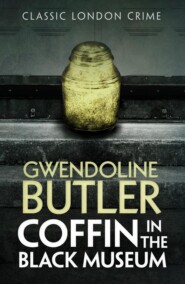По всем вопросам обращайтесь на: info@litportal.ru
(©) 2003-2024.
✖
Coffin in Fashion
Автор
Год написания книги
2018
Настройки чтения
Размер шрифта
Высота строк
Поля
‘Come in, Mrs Hilaire.’ Miss Fraser took her hand away from the door, and momentarily leaned against it as if she could do with its support. ‘Let me get you a chair. Steve, get one for your mother.’
Silently Steve got off his chair for his mother to sit down. Their eyes met and passed each other without comment. Rose’s gaze slid on and settled on the policewoman.
‘What’s this? Why is she here?’ Rose, when frightened, was always aggressive.
The policewoman looked at Miss Fraser, who gave a slight nod. They settled it between them that Miss Fraser would do the talking. At first.
Rose’s eyes flicked nervously to Steve. ‘What’s it about, then? Why am I here? What’s it to do with Steve?’
She couldn’t stop her eyes going back to that bag of his.
‘This afternoon,’ began Lovella Fraser, ‘the school had its uniform inspection, there’s always one once a term. Just a check-up to see that everyone has the right shoes, and blazer and so on. Sports equipment, that sort of thing. Every child lays out his stuff, and we do it form by form.’ She nodded towards the bearded man. ‘Mr Gordon is Steve’s form-master.’
‘So what’s the mystery?’ Rose was getting her nerve back. ‘Steve – you haven’t taken anything that doesn’t belong to you?’ At times of pressure the old Paradise Street slipped out; petty theft had been an occupation there, and accusations of it a commonplace of life.
‘No, we don’t think he’s taken anything.’
‘Come on then. Why am I here?’
Miss Fraser cleared her throat, she was still to do the talking. ‘I don’t know if you have heard about Ephraim Humphreys?’
Rose stared at her, she appeared to be searching her memory. ‘I don’t know.’ She frowned, temporarily off balance. ‘Ephraim Humphreys … ? He’s a boy, a little boy?’
The policewoman made an involuntary move. Young, yes, still a boy, aged twelve. But not so little. Tall for his age. Above average. Steve was tall also, although his choirboy-like innocent face sometimes made you forget this.
‘I don’t read the papers much,’ Rose stumbled on.
Miss Fraser accepted the tacit admission that Rose knew more than she seemed capable of getting out. ‘Yes. It has been in the newspapers.’
‘He’s gone away?’ Her gaze fell upon Steve’s sports bag, her Christmas present to him and now on the headmistress’s desk. Open.
The woman detective thought: Gone away was one way of putting it. Two weeks ago a twelve-year-old boy called Ephraim Humphreys, a pupil at Hook Road School, left his family home after a sparse breakfast in good time to do his paper round and then get to school … The woman detective shifted her stance from one foot to another.
‘No one knows if he ever got here, his papers were delivered but no one noticed if he arrived at school or not.’
‘I’m remembering,’ said Rose. It had all happened at a time when she was busier than usual getting together the winter collection of clothes. They made four collections a year, as did most wholesalers (and in spite of her chain of shops, that was how she regarded herself; she wasn’t a couture house, that was sure). The winter collection, the third for which Gabriel had been responsible, had been a difficult one. Skirts were going up, getting shorter and shorter, but there were hints that daytime overcoats might suddenly lengthen, sweeping the ground. At least one Paris house had shown some such, and one New York. In New York they had, as they say, bombed. But who could say what London would do? London took its own line, it was on its own. Rose had wanted to stay with a safe, half-way line and Gabriel had said that was disaster, you had to be brave and plunge. Literally, let the hemline of heavyweight winter coats drop, go right down to the ground. Team them with short, short skirts and wet-look shiny boots, and you would have a total look. It had been their first big quarrel. Not the last, by any means, but the biggest and the loudest. Gabriel had won.
Into their quarrel the story about the local boy who had gone missing had hardly penetrated, but she found now she could dig out more details than she would have guessed. It was all there, a story waiting to tell itself to her.
The boy had gone out from his home in Decimus Street after eating a bowl of ready-cook porridge and drinking a cup of tea. He had been wearing his usual school clothes, but on his feet his favourite but eccentric red boots. These had been a present from his grandmother in America. He loved them and always wore them when he could. They had a soft canvas top and leather bindings, a kind of house slipper really, and not for outdoors. He would have to change them when he got to school because they were not allowed with the school uniform.
He had not been missed until the late afternoon when his mother came in from work; she thought he might be playing with friends and waited. When her husband arrived they both took alarm. They tried asking friends and neighbours but no one had seen Ephraim. The husband (who was not the boy’s father) went round the streets looking for the boy, the wife stayed at home, waiting in case her son came back. Next day they discovered he had never been at school. But by that time the police already knew and were on the job.
‘Yes, it’s all coming back,’ said Rose. In fact it came back with a quick fast flood that she found painful. She remembered how the mother had looked when she appeared on television appealing about her son, and how untidy her hair had been; she remembered how the owner of the newspaper shop had managed to look both defensive and guilty when he was probably neither. She remembered the woman on the bus who was crying. Where she came in Rose had no idea but she clearly remembered the woman’s tears. ‘You didn’t know him, did you, Steve?’ Not specially know, not as a friend, surely she would have remembered.
‘Yes, Steve did know him. They were in the same form.’ Miss Fraser provided the answer. She looked at Mr Gordon, who spoke for the first time.
‘I don’t believe they were special friends. But I could be wrong.’
‘Well, he didn’t say anything to me.’ But when did he ever say anything to her? Everyone, or almost everyone, had a secret life, but Steve’s sometimes looked like a secret even from him.
‘Inside the bag we found these …’
Jim Gordon unzipped the bag slowly, or it felt slowly to Rose, and took out, first a white sweater, then a light cotton shirt with matching trousers, the boys’ sports outfit, and a crumpled tracksuit. She recognized them all as Steve’s, they had his look somehow, smelt like him.
Then he held the bag out wide and let Rose look in. At the bottom of the bag, dented and crushed, looking as if they had been there undisturbed for some time were a pair of red boots. The red boots.
Rose raised her head from the survey. ‘Ephraim’s?’
She did not look at Steve, but she knew he was staring out of the window with the air of one who had nothing to do with what was going on here.
Now the policewoman came forward. ‘I’m Joan Gilmour, Mrs Hilaire, Sergeant Joan Gilmour. These are the boots the boy was wearing when he disappeared. Or we think they are. We can’t be quite sure without a positive identification from Mrs Humphreys. Or forensic proof. Or perhaps both … But Steve says he doesn’t know anything about them.’
Rose shook her head. ‘Then he doesn’t.’
Gently the other woman said: ‘From the look of it, they have been in his bag some time … He must have seen them every time he went to the bag. But he won’t say … We thought you might talk to him.’
Rose smiled, it was a game smile in the circumstances, but it stretched across her face like a grimace of pain. ‘I don’t believe Steve will talk to me. He doesn’t usually. He might talk to me on the telephone, or he might write me a message, if he had something specific to say. Such as affected his own comfort, you understand …’
‘Mrs Hilaire …’ began Miss Fraser, her voice shocked, but Rose went on:
‘He won’t talk to me. If you want to get someone to talk to Steve then I suggest you try Miss Andrews who teaches English and drama. She likes him.’
‘We all like Steve.’
Rose nodded. Good. So did she, she supposed, and a fat lot of good it did her. No, that wasn’t true: she loved him, but she sometimes found it hard to like him.
‘And Miss Andrews has spoken to Steve: she was there when the boots were found, as it happens.’
‘This is serious, Mrs Hilaire,’ said Sergeant Joan Gilmour. ‘Can you make Steve see how serious and that we can’t accept his story as it stands?’
‘He knows it’s serious, I expect.’ She looked at her son. ‘Well?’
Steve opened his mouth as if to speak.
‘Be careful what you way, Steve,’ said Jim Gordon.
Steve stopped talking even before he had started. Rose knew that phenomenon. It had started out in life with her and she still saw it daily, as if Steve had words ready to pour out to her and bit them back. She had stopped wondering why he did it. In her heart she knew that one day he would tell her and the truth would be hard to bear, better put it off.
A heavy silence settled on the room. Everyone in the room, except Rose, was wondering how to deal with it. The policewoman thought a good hard smack might be the answer, but couldn’t be the one to deliver it. Jim Gordon knew he shouldn’t have spoken and was regretting that he had opened his mouth; he was sunk in his own problem. So too for that matter was Lovella Fraser, who knew she had to control the situation and come out of it well; she knew, all the teachers at Hook Road School knew, that when the great amalgamation of three schools into one big comprehensive took place then the headship of that school would go to the best. She had to be that best. The rivalry among her peers was intense and so was the gossip about who was coping well with what.
They sat on for a while in silence. Steve obviously did not feel impelled to speak. Rose could have told them that at no time did he feel that obligation.
Lovella Fraser stood up. ‘We can’t leave the matter here, Steve, Mrs Hilaire, I’m sure you see that. The police will want to go on questioning you, Steve, and Sergeant Gilmour will probably have to take you down to the police station.’
—And you will be out of my hands and not under my direction to make you speak or not to speak. What she was doing was a failure of her responsibility to the boy, but a holding operation as regards her own career.
Sergeant Joan Gilmour got up too. ‘Mrs Hilaire will have to come too. She must be there when we talk to her son.’ Her voice was not friendly. Rose, an old inhabitant of Paradise Street, who had heard that tone from the police before, at once felt three feet tall and aged five, and someone who had stolen a bar of chocolate. Stolen it, as she now recalled, not because she had no money but because chocolate was rationed.











